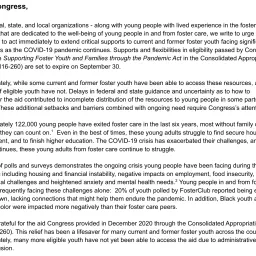As national, state, and local organizations - along with young people with lived experience in the foster care system - that are dedicated to the well-being of young people in and from foster care, we write to urge Congress to act immediately to extend critical supports to current and former foster youth facing significant challenges as the COVID-19 pandemic continues. Supports and flexibilities in eligibility passed by Congress as part of the Supporting Foster Youth and Families through the Pandemic Act in the Consolidated Appropriations Act (P.L. 116-260) are set to expire on September 30.
Unfortunately, while some current and former foster youth have been able to access these resources, a large number of eligible youth have not. Delays in federal and state guidance and uncertainty as to how to administer the aid contributed to incomplete distribution of the resources to young people in some parts of the country. These additional setbacks and barriers combined with ongoing need require Congress’s attention.
Approximately 122,000 young people have exited foster care in the last six years, most without family or networks they can count on.1 Even in the best of times, these young adults struggle to find secure housing and employment, and to finish higher education. The COVID-19 crisis has exacerbated their challenges, and as the crisis continues, these young adults from foster care continue to struggle.
A series of polls and surveys demonstrates the ongoing crisis young people have been facing during this pandemic including housing and financial instability, negative impacts on employment, food insecurity, educational challenges and heightened anxiety and mental health needs.2 Young people in and from foster care are frequently facing these challenges alone: 20% of youth polled by FosterClub reported being entirely on their own, lacking connections that might help them endure the pandemic. In addition, Black youth and youth of color were impacted more negatively than their foster care peers.
We are grateful for the aid Congress provided in December 2020 through the Consolidated Appropriations Act (P.L. 116-260). This relief has been a lifesaver for many current and former foster youth across the country. Unfortunately, many more eligible youth have not yet been able to access the aid due to administrative delays and confusion. States and child welfare agencies are now in a better position to implement the law than they were eight months ago. By extending key provisions of the law set to expire on September 30, 2021, Congress can bolster the chances of young adults as they continue to navigate the difficult waters of this pandemic during a storm that is not yet subsiding.
Specifically, three key provisions from the Supporting Foster Youth and Families During the Pandemic Act should be extended:
1. Moratorium on aging out of foster care
2. Allowing young people to re-enter foster care
3. Continued access to the increased funding and other important flexibilities for the Chafee and ETV program – including the ability to use Chafee to provide cash assistance to young people and extending eligibility up through age 26 and helping young people navigate to supports and resources.
Ending these provisions on September 30th while the pandemic is still raging will cut off a crucial lifeline for young people without other avenues of support. The Co-Chairs of the Congressional Caucus on Foster Youth have introduced a bipartisan bill Chafee Extension Bill (H.R. 5167), which would ensure young people can continue to access these lifesaving supports and resources. We urge Congress to pass H.R. 5167 before September 30, 2021.
We know that many young people continue to be harmed by the pandemic. The sad truth is that unlike their peers, many foster youth have no family or support network to turn to for help navigating these challenges. Please ensure these young people receive the support and resources they need to survive and thrive.
Thank you for your leadership and consideration.
1Compiled from AFCARS data reports #22-27

